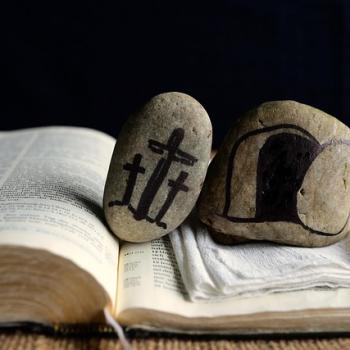For this kind of education, nothing short of total immersion in a world of choice and consequence will suffice, and sin is one of those consequences. No other path to perfection is possible, as Julian of Norwich learned. "I thought, if sin had not been, we should all be clean and like our Lord, as He made us. And thus in my folly, . . . often I wondered why, by God's wisdom and foresight, He did not prevent sin." And then the answer came to her, that "sin is behovely" [necessary and beneficial], but "all shall be well, and all shall be well, and all manner of things shall be well."
Only by choosing the good and experiencing its fruit do we learn to savor and embrace the good. Similarly, only by choosing the evil and living through its consequences do we learn what evil is and why it deserves to be rejected. Or as Julian saw, "So pain endures for a time. Its role is to purge us, make us know ourselves, and it drives us to the Lord." Therein lies the "needfulness" of sin, the part it has to play.
The first woman philosopher in England, Anne Conway, reasoned the same way. "Every sin will have its own punishment and every creature will feel pain and chastisement, which will return that creature to the pristine state of goodness in which it was created and from which it can never fall again because, through its punishment, it has acquired a greater perfection and strength. . . . Hence, one can infer that all God's creatures . . . must be changed and restored after a certain time to a condition which is not simply as good as that in which they were created, but better."
The question is, having established that we are the products of our own choices, and that they are etched into our very identity and determine our destiny, how do we step off the train, to attain that "better condition"? How do we create a new self, a new trajectory, and a new future? The simple truth is that we are imperfect beings, possessed of imperfectly developed wills, confronting a world constructed as an arena of challenge, opposition, and temptation.
The very real detritus of lives tainted by selfishness, ambition, and pride constitute the prison of sin in which we entomb ourselves. The burden of sin that has become habit, the self-perpetuating spiral of choices that further compromise our will and weaken our resolve, a character impaired by the accumulation of soul-damaging decisions, all conspire to make our predicament seem hopeless. In protesting his mother's evil actions, Hamlet begs her to change her course, telling her the freedom to change still operates where habit is not yet set in stone. "Let me wring your heart," he pleads, "for I shall, if it be made of penetrable stuff; if damned custom have not brazed it so, that it be proof and bulwark against sense."
Most human hearts, we find, are made of penetrable stuff. Several catalysts to change open to our possible futures. We may find we are simply fatigued with the world, discovering its satisfactions so far beneath our expectations. "As long as I can conceive something better than myself I cannot be easy unless I am striving to bring it into existence," says one of George Bernard Shaw's characters. It may be simple love of others that motivates us to live kinder, gentler lives. Or it may be, as Clement of Alexandria believed, the memory of a more joy-filled way, "the recollection of what is better," that leads us to repent "for what is worse," retrace our steps, and "speed back to the eternal light, children to the Father."
Such intimations may be the impetus we need to examine our behavior and its consequences, in order to change, to align ourselves with principles of happiness, "the object and design" of our existence. We cannot ourselves transcend the consequences of our own past choices, or suddenly acquire a new human nature unshaped by our own history. The inevitability of sin means the inevitability of sinful habits and consequent alienation from God and His heaven. In His infinite love and compassion, however, God wills the reintegration of every individual into the Heavenly Family. The human freedom to sin thus collides with God's desire to exalt and bless. The problem of how to reconcile this tragic collision is the problem of atonement, by which we mean, full and harmonious reconciliation. Any solution, any version of at-one-ment or reconciliation to God, must bring all who sojourn on earth back to God's presence, but must do so without violating human agency.
Genuine moral agency entails necessary consequences. Choice is always choice of something. In John Stuart Mill's classic treatment of the subject, human liberty requires the freedom "of doing as we like, subject to such consequences as may follow." Those consequences may look like punishment or reward from our perspective, but they were chosen. That is how freedom operates, ideally at least. Consequences are chosen at the time actions are freely committed. To choose to indulge a desire is to choose its fruit—bitter or sweet—assuming, and this is a crucial caveat—that "men are instructed sufficiently" to understand what they are choosing.




